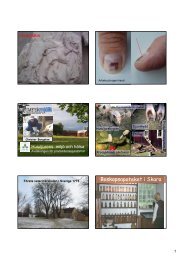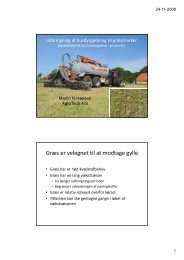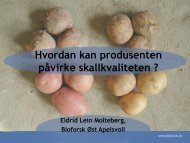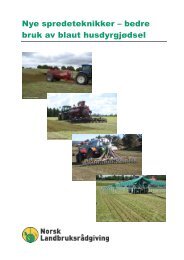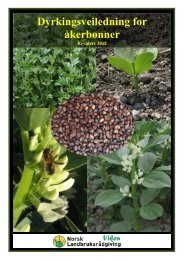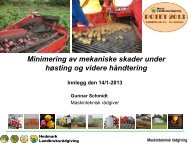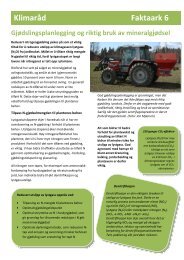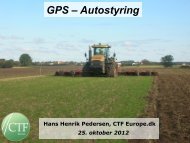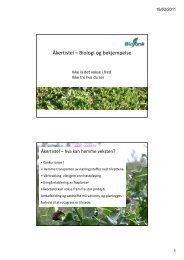You also want an ePaper? Increase the reach of your titles
YUMPU automatically turns print PDFs into web optimized ePapers that Google loves.
Fig. 1. Adult carrot psyllid. Photo: Bioforsk<br />
The carrot psyllid also has a strong preference concerning its summer host. Studies have<br />
shown that it chose carrot over other host plants (Rygg 1977; Nehlin et al. 1996). Rygg<br />
also found that the carrot psyllid could not complete its development on other hosts he<br />
investigated. In other studies, where the females were not given a choice of host plants,<br />
they layed eggs on several species related to carrot and the larvae were able to develop on<br />
most of these (Valterová et al. 1997).<br />
When the adults have settled on the carrot plants they begin feeding. They feed by<br />
inserting a stylet into the plant tissue (Hodkinson 1974) and suck nutrients from the<br />
phloem. Feeding by carrot psyllid causes curling of the youngest leaves (fig. 2), not<br />
necessarily directly at the feeding site. This is assumed to be the result of a toxin that is<br />
transported systemically in the plant causing other symptoms, including wilting and death<br />
of the plants (Markkula & Laurema 1971). The toxin is unknown, but recent studies have<br />
shown an association between the carrot psyllid and the plant pathogenic bacterium<br />
Candidatus Liberibacter solanacearum (Munyaneza et al. 2010). In a Norwegian study, a<br />
trained test panel conducted sensory tests of carrots with different levels of carrot psyllid<br />
damage (Seljåsen et al. 2006). They found that plants with heavy attack early in the<br />
growth period yielded carrots that had negative taste characteristics, including bitterness<br />
and astringency, and that the carrots were tough and lacking crispness.<br />
Meadow. Bioforsk Rapport vol. 5 nr. 151 2010<br />
3




